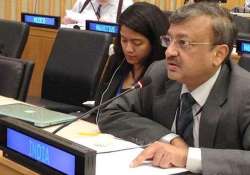India urges global action to deny facilities for LeT, IS
United Nation: Against the backdrop of last week's Beirut and Paris terrorist strikes, India has renewed its call for international action to deny finance and space to organisations like the Lashkar-e-Tayyaba (LeT) and the Islamic

United Nation: Against the backdrop of last week's Beirut and Paris terrorist strikes, India has renewed its call for international action to deny finance and space to organisations like the Lashkar-e-Tayyaba (LeT) and the Islamic State (IS).
The two attacks highlight the international failure to finalise the Comprehensive Convention Against International Terrorism (CCAIT), which would require countries to take action against terrorist groups and stop aiding them, India's Deputy Permanent Representative Bhagwant Singh Bishnoi told the Security Council on Tuesday.
"The price that we pay for procrastination is often in human lives," he said.
"All terrorist organizations -- Daesh (Islamic State) or A1 Shabaab or Lashkar-e-Tayyaba or A1 Qaida-have an ideological basis that contradicts the basic tenets of humanity," Bishnoi said. "Ideology alone, however, is not enough to sustain terrorists. They need financing and space to operate," he said.
Also Read: Video confirms presence of ninth assailant in Paris terror attacks
"That is, unfortunately, provided to them," he added making the case for CCAIT. "And that is what needs to be addressed collectively."
The CCAIT has been languishing for almost a decade because of disputes over the definition of terrorists as some countries claim that it should not apply to those whom they consider freedom fighters.
Speaking at the Security Council debate on "Maintaining of International Peace and Security," Bishnoi questioned the assertions that poverty breeds terrorism.
"The terrible events of last week, in Beirut and Paris, demonstrate to us that the greatest threat to peace and security comes from violent extremism and religious fanaticism, not from the absence of economic and social development," he said. "It is the purveyors of hate and those who characterize others as infidels who are responsible for the violence that threaten our civilisational values."
"We need to also acknowledge that it is the absence of state authority, or weak state authority, that provides the breeding ground for extremist organizations to operate," he added.
Bishnoi criticised the Security Council as a non-representative and opaque body that was trying to infringe on the area of the General Assembly. "Just because the three pillars of the United Nations - namely, peace and security, development and human rights - are interdependent, it does not ipso facto mean that the Security Council must arrogate all these functions to itself," he said.
"The Council will, however, have our full support in its efforts to curb dangerous and extremist trends," he added. "The consolidation of political processes and solutions, while also building durable state institutions, will go a long way in addressing extremism and radicalization. "